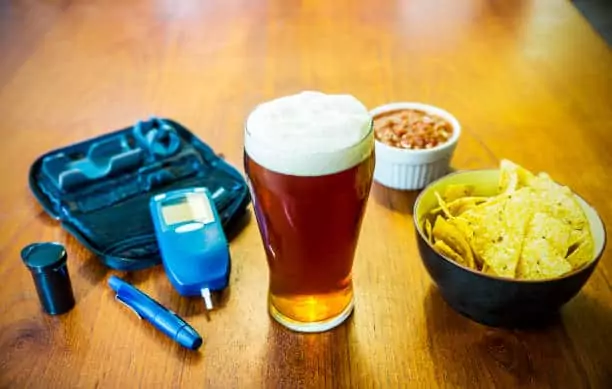Alcohol and Diabetes: A Complex Relationship
Alcohol has a complex relationship with diabetes. In moderation, alcohol may not have a significant impact on blood sugar levels, but excessive consumption can lead to both immediate and long-term complications.

Immediate Effects of Alcohol on Blood Sugar
When you drink alcohol, the liver’s ability to produce glucose is inhibited, which can result in hypoglycemia (low blood sugar)—especially if you take medications like insulin or sulfonylureas that also lower blood glucose levels. Hypoglycemia can be dangerous, leading to symptoms such as dizziness, confusion, sweating, and even loss of consciousness.
On the other hand, excessive drinking can cause a spike in blood sugar levels because many alcoholic beverages, particularly cocktails, wine, and beer, contain carbohydrates that can raise glucose levels. Over time, chronic alcohol use can contribute to poor glycemic control and exacerbate insulin resistance.
Long-Term Effects of Alcohol on Diabetes
Long-term alcohol consumption can negatively affect diabetes management by:
- Worsening insulin resistance: Chronic alcohol consumption can lead to liver damage, including fatty liver disease, which impairs the liver’s ability to regulate glucose metabolism.
- Increased weight gain: Alcohol is high in empty calories, and excessive consumption can lead to weight gain, making it more difficult to control blood sugar levels and insulin sensitivity.
- Complications with medications: Alcohol can interact with many medications used to treat diabetes, altering their effectiveness and increasing the risk of side effects.

Given these risks, it’s important for patients with diabetes to understand how alcohol might interact with their medication, particularly when taking drugs like Rybelsus.
Rybelsus and Alcohol: What You Need to Know
Rybelsus, like other diabetes medications, can interact with alcohol, potentially affecting its effectiveness and safety. While there is no official contraindication against moderate alcohol consumption for patients taking Rybelsus, there are important considerations to keep in mind.
Risk of Hypoglycemia
Although Rybelsus is less likely to cause hypoglycemia on its own (since it stimulates insulin only when blood sugar levels are elevated), drinking alcohol can increase the risk of low blood sugar—especially if consumed on an empty stomach or in large quantities. This is because alcohol inhibits the liver’s ability to release glucose into the bloodstream.
Patients who drink alcohol while taking Rybelsus should monitor their blood sugar levels closely to avoid hypoglycemia. It is also advisable to have a carbohydrate snack or meal while drinking to help stabilize blood sugar levels.
Increased Gastrointestinal Side Effects
One of the most common side effects of Rybelsus is gastrointestinal discomfort, including nausea, diarrhea, and vomiting. Alcohol can exacerbate these side effects, particularly if consumed in large amounts. This is because alcohol is irritating to the stomach lining and can further slow gastric emptying—one of Rybelsus’ primary actions.
Patients who are sensitive to these side effects should limit their alcohol intake to avoid worsening gastrointestinal symptoms.
Potential Impact on Weight Management
Rybelsus is not only effective in lowering blood glucose levels, but it also promotes weight loss in many patients by reducing appetite and slowing gastric emptying. However, drinking alcohol can undermine these effects, as alcoholic beverages are often high in calories and can stimulate appetite, leading to overeating.
To maximize the weight-loss benefits of Rybelsus, patients should be mindful of their alcohol consumption and avoid high-calorie alcoholic drinks, such as cocktails, sweet wines, and beer.
Liver Health and Alcohol Consumption
Patients with type 2 diabetes are at an increased risk of developing non-alcoholic fatty liver disease (NAFLD) due to insulin resistance and high blood sugar levels. Chronic alcohol consumption can further damage the liver, increasing the risk of liver disease and impairing glucose metabolism.
Since Rybelsus works partly by regulating the liver’s production of glucose, maintaining liver health is essential for optimal treatment outcomes. Patients taking Rybelsus should limit their alcohol intake to prevent liver damage and avoid interfering with the medication’s effectiveness.
Guidelines for Drinking Alcohol While on Rybelsus
While alcohol is not strictly prohibited for patients taking Rybelsus, moderation is key. The following guidelines can help patients enjoy alcohol responsibly while minimizing risks:
- Limit alcohol intake: The American Diabetes Association recommends no more than one drink per day for women and two drinks per day for men. One drink is defined as 12 ounces of beer, 5 ounces of wine, or 1.5 ounces of distilled spirits.
- Avoid drinking on an empty stomach: Always consume alcohol with food to reduce the risk of hypoglycemia and help stabilize blood sugar levels.
- Monitor blood sugar levels: Keep a close eye on your blood glucose before, during, and after drinking. Be especially cautious of delayed hypoglycemia, which can occur several hours after alcohol consumption.
- Choose lower-calorie alcoholic beverages: Opt for drinks with fewer carbohydrates and calories, such as dry wine, light beer, or spirits mixed with water or diet soda, to avoid unnecessary weight gain.
- Stay hydrated: Alcohol is dehydrating, which can worsen the side effects of Rybelsus. Drink plenty of water while consuming alcohol to stay hydrated and minimize gastrointestinal discomfort.
- Consult with your healthcare provider: Before drinking alcohol, discuss your intentions with your healthcare provider, especially if you are newly diagnosed with diabetes or have complications like liver disease.
Rybelsus and Responsible Alcohol Use
Rybelsus has revolutionized type 2 diabetes treatment by offering the benefits of GLP-1 receptor agonists in a convenient oral form. Its ability to lower blood sugar, promote weight loss, and improve overall health outcomes has made it a valuable tool in the fight against diabetes. However, like all medications, it’s important to understand how lifestyle factors—such as alcohol consumption—can impact its effectiveness and safety.
While moderate alcohol consumption may not pose a significant risk for patients taking Rybelsus, excessive drinking can lead to complications such as hypoglycemia, gastrointestinal distress, and weight gain. By following guidelines for responsible alcohol use and consulting with healthcare providers, patients can safely manage their diabetes while still enjoying the occasional drink.
In the end, the combination of cutting-edge medication like Rybelsus and informed lifestyle choices is key to achieving the best possible outcomes for individuals living with type 2 diabetes.

